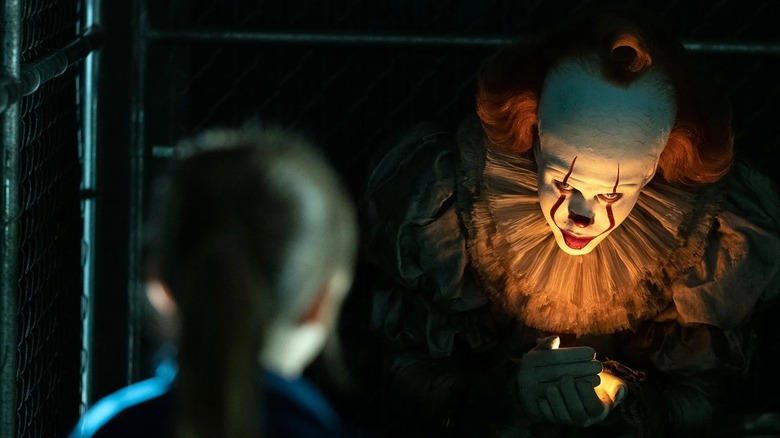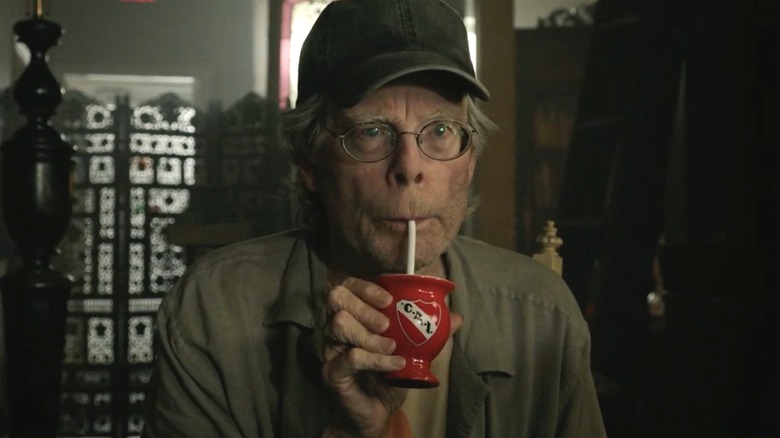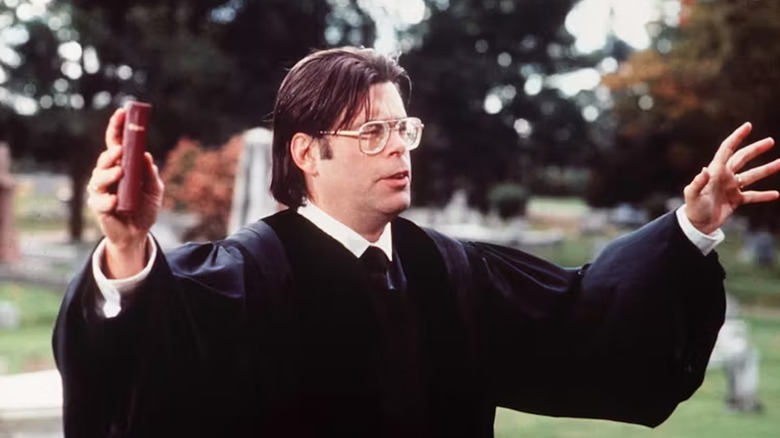Stephen King Almost Stopped Writing Horror Books After One Of His Biggest Hits
Stephen King's mastery over horror is indisputable. The author's horror-focused stories have a way of crawling into our psyches and staying there, appealing to both morbid curiosities and integral truths about the human condition. There is a reason why King's works are molded into cinematic adaptations time and again, even when some stories inherently feel more suited to the written medium, along with the specific interiority it demands from readers. When King stumbled upon his inspiration for "It" in 1978 while living with his family in Boulder, Colorado, and finally began penning the novel in 1980, it felt like a massive moment for the pulp horror genre, where more people started gravitating towards stories of a similar variety. Although the book's reception at the time of its release was enveloped by controversy, "It" received favorable reviews for its visceral, uncompromising exploration of the loss of childhood innocence, and the horrors that come with it.
"It" was a pretty strong entry in the horror genre, and King followed up its release with projects that did not directly dive into the genre, as he focused on mystery or psychological intrigue instead. According to TIME, the work that followed "It," "The Eyes of the Dragon," was an "Arthurian sword-and-sorcery epic" dedicated to his daughter, who disliked horror, while works like "Tommyknockers" and "Misery" were scheduled to release next, focusing on sci-fi exploits and psychological thrills respectively. After "It" was released, King was ready to do something different; he shifted gears from horror completely in favor of works that were more palatable to the masses, and the reason behind it is somewhat complicated to parse.
King was plagued with self-doubt after It was released
The controversy surrounding "It" and its shocking, graphic sexual content might have contributed to this decision at the time, but King was also hyper-aware of astoundingly talented fellow horror writers whom he deemed better in a sincerely appreciative vein. In a 1986 TIME interview, for example, King had to say the following about horror author and filmmaker Clive Barker:
"You read him with a book in one hand and an airsick bag in the other. That man is not fooling around. He's got a sense of humor, and he's not a dullard. He's better than I am now. He's a lot more energetic."
In the same interview, King seemed hyper-critical about his worth as a writer and hinted that he was done with writing horror after "It." "I've had about three original ideas in my life. The rest of them were bounces. I sense the limitations of where my talents are," King stated while calling himself "not much of a writer" but "a hell of an elaborator." Well, even the best writers are intimately acquainted with imposter syndrome and the damaging narratives it can weave in our heads. In King's case, these self-deprecating statements have little truth to them — something he must have come to realize when he picked horror back up after a while, proving to the world (and to himself) that his prose is best suited to evoking ideas that truly frighten us as a collective, and compel us to delve deeper into the darkness teasing the edge of our visions.
King also shared the core inspirations behind his horror-focused tales, explaining his tendency to focus on personal phobias revolving around "spiders, elevators, closed-in places, the dark, sewers, funerals, the idea of being buried alive, cancer, heart attacks, the number 13, black cats and walking under ladders." That's a pretty long list and not an unreasonable one by any means, but King's novelty as a writer lies in his ability to turn these specific fears into something universal, which everyone can relate to despite a real-world absence of that same fear.
Moreover, phobias are often birthed after they are explored in fiction, a good example being the gnarly, bug-themed typewriters in David Cronenberg's "Naked Lunch," which instill these perfectly benign machines with a sense of whimsical dread. A similar effect can be observed in King's novels, where something as mundane as a car or a dog is morphed into a more sinister interpretation of that same object, conjuring nightmarish scenarios that make for really good horror fiction.
Stephen King and horror remain inseparable
While King's talents for conjuring strange worlds extend beyond his mastery over horror, this particular genre seems intricately intertwined with King's literary ethos and brings out his strengths as a compelling storyteller. Evoking the perfect amount of tonal ambiguity is key to writing good horror, where the reader should be able to easily suspend disbelief while still questioning the nature of the strangeness that defines the reading experience. King does this very well, in a way that almost feels effortless, and his tales often become allegories for bigger, grander ideas about morality and the nature of human existence.
Although King was almost convinced (back in 1986) that giving up on horror was the right thing — calling it "clearance sale time" where "everything must go" — he returned to it soon after and wrote a chunk of genre tales that still frighten and terrify. In 1989, Kind published "The Dark Half" under the pseudonym Richard Bachman, telling a more intense, cynical tale about a recovering alcoholic author whose artistic alter ego comes back to haunt even after it is laid to rest. From this point on, King embraced his affinity for horror with authenticity, penning works like "Gerald's Game" and Dolores Clairborne" in the years that followed, with non-horror gems like "The Stand" — which is more of a post-apocalyptic dark fantasy and one of King's best works — highlighting his ability to be so much more than a pulp horror writer.
In case you want to check out King's latest contributions to the genre, be sure to read "You Like It Darker," a collection of 12 short stories (some of which are best-sellers while others never been published before). As usual, King doesn't disappoint; these tales are engaging and ambitious enough to eclipse their immediate confines, evolving into themes about existential crises and broken dreams.


